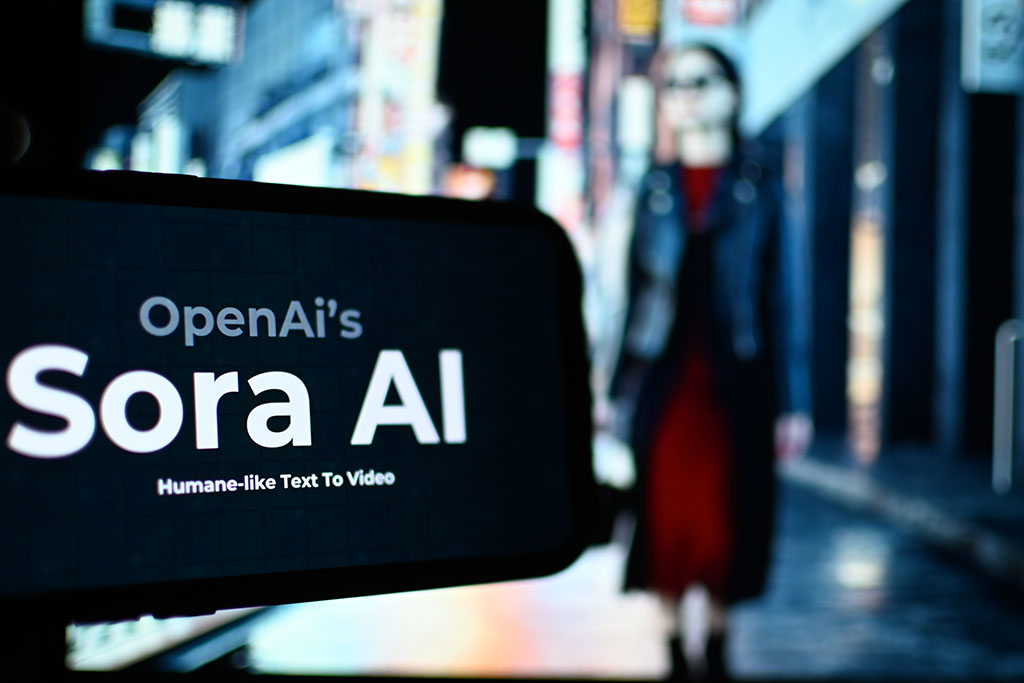
OpenAI’s New AI Video Generator “Sora” Makes Waves with Creative Power and Strict Safeguards
OpenAI has launched its groundbreaking AI video generator, Sora, sparking widespread interest and raising critical questions about the future of AI-generated content. Sora allows users of ChatGPT’s premium plan to create video content with simple text prompts, bringing fantastical scenes—like sumo-wrestling bears and coffee-sipping cats—to life. However, OpenAI has imposed significant restrictions on Sora’s capabilities to prevent misuse, particularly when it comes to depicting people.
Revolutionizing Video Creation
Sora represents a major step forward in AI technology, offering users the ability to produce high-quality video content without the need for expensive equipment or specialized skills. Businesses and creatives alike are eyeing the tool for its potential to revolutionize marketing, entertainment, and more. Text-to-video technology like Sora could drastically cut production costs while opening up new creative possibilities.
IS YOUR COMPUTER SECURE?
FREE Malware Removal
Detect & Remove Adware, Viruses, Ransomware & Other Malware Threats with SpyHunter (FREE Trial)
IS YOUR COMPUTER SECURE?
FREE Malware Removal
Detect & Remove Adware, Viruses, Ransomware & Other Malware Threats with SpyHunter (FREE Trial)
IS YOUR COMPUTER SECURE?
FREE Malware Removal
Detect & Remove Adware, Viruses, Ransomware & Other Malware Threats with SpyHunter (FREE Trial)
For now, the tool is accessible only to a limited audience. OpenAI has granted full access to human video generation features to a small group of testers, citing concerns about the potential for deepfake misuse and misappropriation of likenesses. By restricting these features, OpenAI is taking a cautious approach to ensure the technology isn’t used maliciously.
Tight Controls on Content Generation
OpenAI has introduced robust safeguards to mitigate the risks associated with Sora. These include blocking explicit content, such as nudity, and prioritizing the prevention of harmful uses like child sexual abuse material and sexually explicit deepfakes. The company has made it clear that ethical deployment is a top priority, demonstrating its commitment to balancing innovation with responsibility.
Concerns about deepfakes and impersonation remain central to the debate surrounding AI video tools. The ease with which such technology can replicate real individuals in video could have far-reaching implications for politics, entertainment, and society at large. OpenAI’s restrictions aim to prevent these potential harms while still allowing users to explore creative applications.
Overwhelming Demand and Limited Access
Since Sora’s public release on Monday, the tool has generated significant excitement, to the point that OpenAI temporarily halted new account registrations due to heavy traffic. This reflects the immense interest in the capabilities of text-to-video technology, as well as the broader curiosity surrounding generative AI.
OpenAI initially unveiled Sora earlier this year but delayed its public launch to consult with artists, policymakers, and other stakeholders. This measured approach underscores OpenAI’s recognition of the ethical complexities tied to such a powerful tool.
Questions Around Training Data
One area where OpenAI has been less transparent is in the training data used to develop Sora. While the company has faced lawsuits over the use of copyrighted text to train its ChatGPT models, it has not disclosed the sources of imagery and video used for Sora. This lack of clarity is likely to attract scrutiny as the conversation around copyright and AI continues to evolve.
The Road Ahead for Sora and AI Video Technology
As one of the first major players to release a text-to-video tool, OpenAI’s Sora is poised to set the tone for how such technology is received and regulated. While the company’s proactive approach to addressing ethical concerns is commendable, it remains to be seen how effective these safeguards will be at scale.
For now, Sora offers a glimpse into a future where AI video generators could become a staple in creative industries. Whether that future is filled with opportunity or fraught with challenges will depend largely on how companies like OpenAI navigate the complex ethical landscape of generative AI.